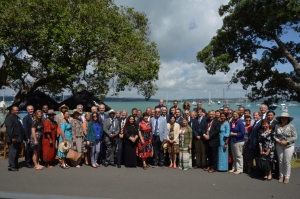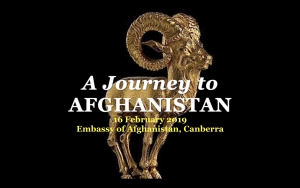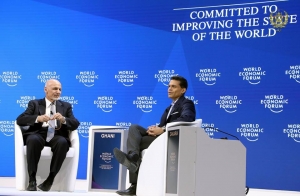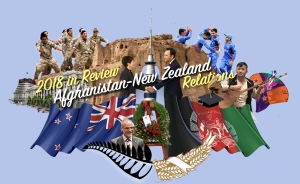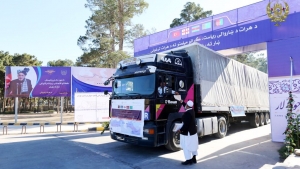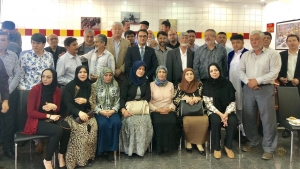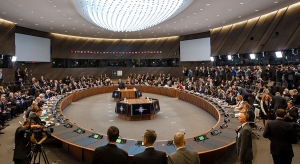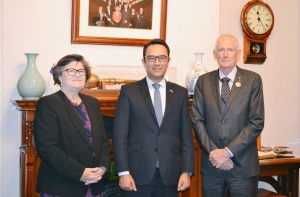Diplomats accredited to New Zealand participated at the Waitangi cermony in Northland on a tour related to the history of nationhood in New Zealand, dating from the signing of Te Tiriti o Waitangi in 1840. Honorable Dame Patsy and Sir David hosted a lunch for them and their partners in Russell on 5th February in Paihia, a city close to the Waitangi.
HE Wahidullah Waissi, who is accredited to New Zealand as a non-resident ambassador, participated at this cermony in Waitangi and Wellington.
The history of diplomatic relations extends past these first formal appointments, with New Zealand’s military contributions in Afghanistan in 2001, and New Zealand’s participation in reconstruction efforts. Since the beginning of diplomatic relations, the two countries have seen a significant growth in their unique relationship, which was furthered in 2017 and 2018 in a range of mutually interested areas.
New Zealand acts as one of the main allies of the United State and NATO, alongside Australia, and the expanding of ties with these countries is essential for Afghanistan’s future.
In his trip to the 2019 Waitangi cermony, Ambassador Waissi met Deputy Prime Minister and Foreign Minister Winston Peters. Both sides briefly discussed issues of bilateral interests and current affairs on Afghanistan.
In two other events, Ambassador Waissi met Honorable Dame Patsy, the Governor General of New Zealand and conveyed best wishes of Afghan government on this auspecious day to the government and people of New Zealand.
2018 was a fruitful year for enhancing bilateral cooperation between both nations. As part of the enhanced interaction with the political structure, Afghanistan and New Zealand developed a Friendship Group at the Parliament of New Zealand in October. Another significant achievement in the Afghanistan-New Zealand relationship was that Afghanistan appointed its first Honorary Consul to New Zealand, Mr Yasin Hotaki, who commenced the position to facilitate consular related services of Afghanistan for those Afghans residing in New Zealand, with a greater focus on trade and business. Mr Hotaki is a resident in Auckland with consular jurisdiction throughout New Zealand.
2019 marks the second year the Embassy of Afghanistan will participate in the National Multicultural Festival, and the Embassy invites all members of the community to join in celebrating Afghanistan and its culture, history and traditions. This year is also an opportunity to commemorate 50 years of bilateral relations between Australia and Afghanistan, and look forward to a future of cultural exchange and cooperation together.
The National Multicultural Festival is an annual festival organised by the ACT Government which involves hundreds of community groups, national and local businesses and foreign diplomatic missions, amongst others. The Embassy of Afghanistan counts amongst the participants, alongside over 300 stalls from around the world. The National Multicultural Festival will be held from Friday the 15th to Sunday the 17th of February in Canberra’s city centre, which will be transformed into a venue for live music, dancing, food and activities.
The Embassy invites friends of Afghanistan, business owners, Afghan diaspora communities and all other members of the public and their families to visit the official stall on Saturday the 16th of February. The stall will be located near David Jones in the City Center (Stall 32 and 33) and will provide an insight to the culture and traditions of Afghanistan, as well as give a flavour of the country with local sweets, drinks and snacks available. There will be activities for children, displays of traditional clothing, musical instruments and kites, as well as a range of other displays and a photography station for visitors to take a piece of the festival home with them. The 2019 stall will also be home to photographs and information launching the 50th anniversary of Afghan-Australia bilateral relations.
The Embassy looks forward to warmly welcoming all visitors and their families and friends to the official stall on Saturday the 16th (from 10 am to 10 pm) and hopes that this year’s National Multicultural Festival is an opportunity to learn about Australia’s rich multicultural society, as well as about the history and customs of Afghanistan.
Davos, 24 January 2019 – Mohammad Ashraf Ghani, President of the Islamic Republic of Afghanistan, disucssed peace, war and democracy in a conversation with Fareed Zakaria, CNN anchor during the World Economic Forum's Annual Meeting (2019) in DAvos. To watch this conversation, please visit here.
The following text is full transcription of the conversation:
Davos, Switzerland, January 24, 2019
Fareed Zakaria: Ladies and gentlemen, thank you so much for coming to this. If I may start before welcoming our honored guest with a few ground rules, we are very appreciative with our audience here at with. This show is also being taped for my CNN program and will be watched by many millions more, so as a courtesy, I would ask that you genuinely turn off your phones so that they do not interrupt the recording. And also if you could just hold off any applause, comments, we’d like to be able to broadcast this in a way that many people can take advantage of the wisdom of our special guest.
So, Henry Kissinger once said, “Those who don’t need introductions crave them the most”. I think this is not true of the President of Afghanistan Ashraf Ghani, entirely rare figure in the modern world and being a genuinely world-class academic, genuine thought leader, a person who had worked at the highest levels of the international system, who then went on to lead a country and has been very successful. So with that, Ashraf Ghani, pleasure to have you.
President Ghani: well, thank you for that marvelous introduction. It is great pleasure to see you and to have opportunity to exchange views with you.
Fareed Zakaria: So the first thing I am going to ask you is what appears to be some breaking news. It is not confirmed. There are reports that, in Doha, there has been some kind of a deal made with the Taliban involving with withdrawal of the American troops and presumably some kind of deal that the Taliban accepts. Is there any truth to these reports? What can you tell us about these negotiations?
President Ghani: Well. Thank you. Peace is an imperative. A war that has gone on for 17 years must come to an end. This war is multidimensional, it is very strong levels of interrelationships and it is not as simple to arrive at a date and think that the war as simply ends. Because on the side of the government of Afghanistan, we have binding legal agreements with the United States and NATO; bilateral agreements and of course, multinational agreements internationally regarding assistance, trade and others.
The Taliban have a series of interrelationships that are below the surface. They have relationships with all known terrorist groups; they have relationships with the largest criminal mafia on earth, which after cocaine is the heroine mafia. They have an organic relationship with the state of Pakistan that has provided them sanctuary, resources, support and others, and they have patron-client relationships with the others. This is a cluster of relationships.
U.S. is committed to see a timeline to the engagements, but to just think that a relationship has arrived, I think, is exaggerated. We need to be able to get the relationship because the dimension that is national namely the Taliban and the Afghan people and the Afghan government, must be resolved politically. But the dimensions that continue the violence and the reason that the international forces are present in Afghanistan is not because of Afghanistan, but because 9/11 on one estimate cost the United States government and society $500 billion.
How do we deal with all these sets of relationship? We have a roadmap, we have detailed discussions. Let us not also forget that Ambassador Khalilzad, my old friend, and special envoy, was not able to meet with Taliban representatives in Pakistan. Does Doha have that authority and the function of Ambassador Khalilzad’s office is that the Afghan government and the Taliban into face-to-face discussions and negotiations. Within that, then the larger issues of U.S. presence and other international issues will be addressed.
Fareed Zakaria: But there is no breakthrough, you are saying, in recent days.
President Ghani: Not in that sense. There is discussion but the discussion needs to be shared back. A discussion that does not involve the region will not last. Afghanistan has national dimensions, neighborhood dimensions, the regional dimension, from India to Russia, the Gulf, Islamic and international. If we don’t get all the pieces right, one piece alone doesn’t suffice.
Fareed Zakaria: How would you respond the people in America, maybe another western countries that have sent troops for seventeen years; this has gone on for 17 years. What have we got now different? We have failed in some sense, they would argue.
President Ghani: No, absolutely, but the first thing is, the United States is not there because it is fighting in Afghanistan. It is fighting for its security. Second, we have engaged in a very open dialogue. The United States as a sovereign power, as a global power, is entitled to leave. But we need to get the departure right. Are the fundamental reasons that brought the United States to Afghanistan—are those objectives accomplished? The first issue is cost. We completely agree that the cost must come down, must become more efficient. So the first thing I request is that everything under the sun should not be built under the war in Afghanistan. When the U.S. navy needs money, when the US army needs money, the U.S. Air Force, it bills it under Afghanistan. What is the cost of the war in Afghanistan?
Second, the number of troops. We are engaged in a discussion, we had initiated this to see that the number corresponds the essential needs, because every U.S. soldier essential at least cost a million dollars a year. On making it more efficient—this is crucial. And we understand that our relationship is based on mutual interest which flows from mutual threats on the one hand, and mutual goals on the other.
So my answer first, I pay tribute to every mother and father who have lost their children in Afghanistan. This has included the highest levels of government, like Secretary Kelly, chief of staff, who lost his son in Helmand.
Second, over a million American soldiers, men and women in uniform, have seen action in Afghanistan; we pay tribute. But the job that we started together needs to move.
Thirdly, since I have become president, a hundred thousand troops left. Over 45,000 Afghan security personnel have paid the ultimate sacrifice. The number of international casualties is less than 72. So it shows you who is doing the fighting, and the support is mutual. We need to get a stable Afghanistan as an entity that can ensure security of America and Europe and others on the one hand, but more fundamentally our own democratic rights and institutions and our right to live in peace and harmony.
Fareed Zakaria: And if I look at Afghanistan today, what I am struck by is, you have a functioning democracy; you are up for elections, elections again in July. There have not been major terrorist attacks in recent months. The economy seems to be moving forward. Is it fair to say that Afghanistan has turned the corner?
President Ghani: Afghanistan is turning the corner. My first tribute is to the Afghan women. Afghan women have come to voice their own. In 33 provinces of Afghanistan there have been discussions, and the last one is taking place now. We are going to have the first Jirga – the gathering – of all Afghan women in the coming month. These are people who grow, come from the grass roots. What do they want? A democratic, orderly system. Second is the youth, the youth of Afghanistan has really come to its own. Please understand that Afghanistan of today is a very different Afghanistan in terms of demographic composition. And three are the poor.
Fareed Zakaria: Different even from Afghanistan of 9/11 in 2001.
President Ghani: Absolutely. Because this generation—we lost three generations to war. This is the first generation that has gone directly from refugee camps and internally displaced people to the best universities on earth, educational capability. We are now able to staff a modern administration and run it, so the ownership and leadership that has come. It is also networked generation. They talk. They are rooted on the ground, but they are able to talk with all our neighbors and to that the global community in a language.
And the economy is beginning to move fundamentally, but the most important thing is our constitution. As you mentioned presidential elections will take place in July. The people of Afghanistan will elect their leaders. From 1747, when the last incarnation of continuous Afghan State has taken place until I succeeded president Karzai, with couple of exceptions, every succession involved a conflict. And in 1992 after the collapse of the Soviet-backed regime, there was no agreement on rules of the game; Kabul was destroyed. The country went to a level of deprivation and destitution that didn’t know. Why? Because a number of people who had all been friends could not agree on rules of the game. The rules of the game are now placed in the constitution.
390 laws have been passed only in the past four and half years. This is different country. I think, I am confident that we can turn the corner. And by 2024, it would be a country that would be able to pay for itself as a going proposition, because you need an economic base, and a country that has a vision of itself as a roundabout where ideas, people and goods can flow.
After 117 years, we have again an integral part of Central Asia. We have fantastic relationship. We look at every aspect of our relationship as an opportunity. So on the one hand, the United States, our foundational partner, Western countries, NATO and non-NATO countries. But the region; we have come with a position vision of good relationship with every single one of our neighbors near and far.
Fareed Zakaria: As you know, there is great debate in the United States about “nation building” and there is a great frustration people say, “Why did we go to Iraq and Afghanistan with the idea that we could national build?” I think what people really need is not “nation building” but “state-building”, “democracy-building”. Is it your view that the situation in Afghanistan proves that that kind of “nation building” does work?
President Ghani: That kind of nation-building works, but not through the foreign agent. Foreign aid needs to be rethought fundamentally. The key is both national ownership and international partnership. With that proposition and making sure that things are not done for you, but that you can really take ownership. I just give you a very small illustration. The Afghan agricultural sector is vital but had not received. Last year, we were the largest producer of pine nut in the world but we didn’t know it, so the international figures showed that our production was 3000 tons, actually it was 26000, because everything was going to Pakistan and then to China as added value.
We created an air corridor, we have just sent in three months, 500 tons of pine nuts to Shanghai and 4000 are going to Istanbul to be distributed. This type of relationship is fundamental so you get it right. And what is important, Business Administration has become a discipline. Political Science unfortunately still at the realm of theory. So state building as a discipline is not consolidated and we need to bring this a lot of people who work and international organizations, my former colleagues, I hope they don’t mind, are amateurs. They are not disciplined. The discipline comes from democratic accountability. Democratic accountability is crucial to make a bureaucrat, a leader responsive. It forces them the national debate. You need to learn. At times I am told, when I speak English international interlocutors think I cannot talk Pashto or Dari or Uzbeki, and when they see me talking those languages, they are amazed because you need to connect; the vocabulary is different. The substance is the same but the vocabulary changes.
Fareed Zakaria: What is the biggest revelation to you? Having been an academic who has studied these issues as a practitioner who now has to actually live these issues.
President Ghani: First is the nature of resistance. Short-term interests unfortunately trumps medium and long-term national interest. And this resistance really needs to be taken seriously, but the second thing which is the pleasant revelation, how much a citizen-focused agenda gets response, and how extraordinary the ordinary people are? What a woman who has lost three sons comes and embraces you and says, “Take my fourth son, but give me dignity.” That is truly something that you cannot put a price on; it is worth billions. Or you see a young child who marches with you and takes a review, her head erect or comes right on my shoulders, saying “This is my grandfather, the president!” on the ones side, this immense decency of the general public, the citizens, on the other hand the short-sightedness.
And the last issues is, a lot of our international colleagues who provide advice are out of touch with the times. They provide you turn of the nineteenth, of the twentieth century or mid-20th century advice. We need to become much more dynamic, much more people-focused.
Fareed Zakaria: The short-term perspective, does it make you wish you had the kind of power that President Xi in China and President Putin in Russia has that put you think long-term for the country?
President Ghani: I think long-term for the country, democratically. We tried authoritarians. We had one of the worst despotisms at the turn of the 20th century. And we had the Soviet style. There is a man called Elphinstone who wrote a book in 1809, he really got it right. He said this country is most suited to democratic governance. Afghans have a sense of equality. When I talk to another Afghan, I am her or his equal and that moves me to tears; we are not sycophants. And authoritarian regimes might suit others, it doesn’t suit our culture. Our culture is one of equality. Hierarchy, market; for the market, we are willing to accept hierarchy. For the state, if we don’t engage in discussion—we have a saying, if you put a meal in front of Afghans but they have not be engaged in cooking it, they will criticize it.
Fareed Zakaria: The single biggest strategic challenge you and your predecessor have had has been that you are facing insurgency of Taliban that has funding, training and geographic support bases in the neighboring country, Pakistan. The Pakistani military has used this to destabilize Afghanistan, to secure what it sees as its interest. There is a new civilian government in Pakistan, a new prime minister; do you sense any change in Pakistan’s attitude towards Afghanistan?
President Ghani: We have talked on the phone. We have not met in person. The proof of the pudding is the fundamental issues in action. We have been promised repeatedly in the past so much as saying that next week they will be changed, and next week, we have seen intensification of the conflict. Afghanistan wants an engagement with Pakistan. Our relationships fall in three buckets; one, removing the shadow of violence. For 40 years, there has been engagement. This engagement is against all international rules, all norms of decency. A neighboring country that recognizes and enjoys particularly close cultural relationship, does not sponsor subversive movements and armed subversive movements. So that is one discussion.
The second is, what should normal cooperative relations between Afghanistan and Pakistan look like? We, I think, will be the greatest asset to a prosperous and stable Pakistan, because we are the source of power from Central Asia and others and the source of transit and connectivity. And three; the joint issue. What do we do with the continuing problem of terrorism? We need to engage. The key is Afghans, as a nation and as state; we are dedicated to overcoming the past. The question that Pakistani leadership needs to face is: is their conduct of the last 17 years benefited them, harmed them, isolated them, made them central, and can they—how would they get to 2047, the year when they celebrate their 100th anniversary. An excellent analysis has been done by the World Bank. If they continue the current course, they will be a very poor country. But if they change and engage in regional cooperative and fundamental economic and social political reform, they could be a middle-income country. The choice is theirs.
Fareed Zakaria: The Trump Administration when it came into office, in a way of relieved you of some uncertainty of the Obama administration which was always debating whether or not to stay in Afghanistan. And the Trump Administration said, “No, we are going to stay.” We are in fact going to increase the intensity of engagement. But they said the same in Syria, and rather bizarrely and dramatically, President Trump decided to withdraw forces. Do you worry that you are going to get a phone call from Mike Pompeo saying “Guess what? The president just tweeted we are going to leave Afghanistan tomorrow.”
President Ghani: The first issue is President Trump and I had an excellent relationship. The South Asia Strategy was a very thoughtful response to a situation. And let’s not forget, the core of the South Asia Strategy was to bring peace to Afghanistan, and we have welcomed this.
Second, it is condition-based strategy, and this condition-based strategy would have been interpreted as putting conditionality on ourselves, not to say that conditions are going to be left to others to change. We have changed our security forces, rootstock and branch during this. Reform of the Inherent Law brought the age of retirement for a general to 56 years. Our four-star generals now retire at 62. Over 2,000 generals and colonels have been retired. We are really focused, we have used this and day by day, we are gaining strength.
Now, as I brought to your attention, a sovereign state, the world’s most powerful, has a right to disengage, but we don’t think it is going to disengage. The reason is not because of wishful thinking, the reason is because of a dialogue that is based on reason and mutual interest. We have had this dialogue because you need to think in scenarios. The problem is the public panics when they think when our scenario is reality. But as you know, the United States has hundreds of scenarios at Department of Defense for every conceivable situation. One of them leaked, we have had discussions.
The South Asia Strategy is the strategy. Proof: the level of cooperation that we have received from the U.S. military and from the U.S. security forces has been immense. During the past month, General Miller has leaned backward, the commander of the Resolute Support forces, to remove uncertainty and to be able to work with us. But the ultimate goal, neither of the United States, nor of Afghanistan is to make this into a permanent thing for ages. Our goal is to become a partner, not a dependent. Because of this, we need to be able to pay for ourselves, for our security and to make sure that the relationships are such.
Bottom line: our cooperation depends on the level and threat of terrorism. If that threat is lowered, off course, the forces need to be lowered and leave, but we need to understand, and you are in a better position than all of us, is this threat over or actually other forms, it is morphing constantly, and as the latest is, is Daesh gone to version 4? If you are talking about the Globalization 4.0, we need to talk also about version 4 of terrorism. That issue requires the attention of all of us.
Fareed Zakaria: Just to clarify, you are saying the Daesh that is ISIS, and presumably the Taliban, the more radical elements of the Taliban still remain real terrorist threats to the west?
President Ghani: They do. And instead of taking my words for it, I think, we need arrive at consensus. To the region also, the problem with some of the regional behavior is, it is reverting to 19th century thinking. They think spheres of influence are a better concept. Let us not forget, the Middle East, Southwest Asia and South Asia have still not arrived at a full embrace of Westphalian system where sovereign states interact with each other. My argument is that both for the economy, for environment, for security, we need to arrive at state-to-state centered relationships so our people can interact, our businesses can interact. But we cannot be seeing zero-sum games, and interference as a way of securing our interests.
Fareed Zakaria: The Trump Administration has also done something which I assume you welcome, which is, it has taken a tough stand on Pakistan, but has that been real? Again there was a certain rhetorical outburst where the Trump Administration and Trump himself threatened Pakistan with the withdrawal of aid and such. Have you seen an increase of an American pressure on Pakistan?
President Ghani: I have. First of all, $1.2 billion were withdrawn. It is an allocation that has never going to be restored, unless in future. Second the level of engagement that has discussion quiet but has been very systematic and very focused. The level of engagement leaves nothing to be desired, it is principled, and we welcome it. But it is also catalytic because it is not pressure for the pressure sake. It is pressure for the sake of engagement. It is an engagement agenda.
Pakistan is a pivotal state in the region. Its stability is vital to Afghanistan’s interest, to India’s interest, to everybody’s interest. We hope that Pakistani leadership would come out of the scars of its creation. Partition was painful, the wounds have been immense, but for South Asia to become whole, like Europe, they need to overcome this trauma of the birth. 70 years is enough time, and in this regard, I think, embrace of 21st century by Pakistan will make all its neighbors and all its international partners, and Islamic partners come to a supporting stand and come to cooperate. So we think the advantages of cooperation for Pakistan are immense. The advantages of confrontation are close to nil. But if there are sections of Pakistani state that still think that, those, we hope, need to rethink.
Fareed Zakaria: So you are the rare foreign leader who has had a very good and productive relationship with Donald Trump. And do you think his policies have basically been supportive and successful? Why do you think that is?
President Ghani: Well. First, I don’t talk much. No literally, maybe you have to be able to get your main arguments in two minutes. President Trump is engaging. And if you get your points across cogently then he’ll ask you questions. Our first phone call, when he was president-elect, lasted fifteen minutes more than we thought, because it was a real conversation. One cannot dismiss the questions, the fundamental questions of a world leader and think one is getting away with it. And the other is you need to be able to represent your country with dignity. I don’t ask. You know, I have never begged for myself anything. For my country, I want.
Third, you need to know to show that you care a lot more about your country than your foreign friends and partners. And fourth, we are very lucky, because we have had a very large range of American diplomats, particularly American military personnel and others, who have gotten to know my country and particularly me. During the years of President Karzai, I was responsible pro bono basis, for bringing the security transition of the U.S. and international forces so that gave me an opportunity to see both my country and to see the relationship.
As part of this modern leadership, particularly for one of the poorest countries on earth, is representation. We have to know the networks. And when context changes, a lot of people fight the context. Our approach has been to say what our opportunities in the new context? And that enables us not to be defensive. So when policy is made, you need to understand it is going to take a process. When the Afghan policy was made by President Trump, a lot of my American friends came and when they came to my room, they were uneasy; this is taking too much time, and I assured them that under President Obama, it took longer. You have friend who understands that policy making and, because of it, I pride myself of never having lost an international colleagues and friend because of short-term worries. And when questions are raised, we answer them.
Fareed Zakaria: So when Americans look back on this long engagement in Afghanistan, you think they can take pride and feeling that they achieve something?
President Ghani: Enormous. First, thank God. There has been no recurrent of 9/11. It is not because of luck. It is because of the immense sacrifice and effort. Second, the Afghan people are a very different people. We are thousands years old civilization and culture, but in terms of youth, we are one of the youngest countries. And three, the fundamental numbers have changed. Democracy, as you have written, and articulate every other day on your program is not an overnight dose that you inject or an injection. Democracy building requires that patience and I think we are at the cusp and with the elections, I hope that the transition will consolidate and we will be able to show that the investment that was made in us was worth it.
Fareed Zakaria: President Ghani, pleasure to have you.
President Ghani: Thank you.
Source: https://president.gov.af/en/News/242019?fbclid=IwAR2SG-i7saZ30H8zhr7gyB45RCRPvki1o5SxDqHUmUezTn4eyl8NixAJaNk (accessed 27 January 2019).
With 2018 drawn to the end, I take the opportunity to reflect on what has been an eventful and productive year as Afghanistan’s non-resident Ambassador to New Zealand.
This reflection builds upon a relationship established over the years, with the appointment of first Afghan non-resident Ambassador to New Zealand, as well as New Zealand’s first non-resident Ambassador to Afghanistan in 2003. The history of diplomatic relations extends past these first formal appointments, with New Zealand’s military contributions in Afghanistan in 2001, and New Zealand’s participation in reconstruction efforts. Since the beginning of diplomatic relations, the two countries have seen a significant growth in their unique relationship, which was furthered in 2017 and 2018 in a range of mutually interested areas.
New Zealand acts as one of the main allies of the United State and NATO, alongside Australia, and the expanding of ties with these countries is essential for Afghanistan’s future. Political engagement between our two countries increased significantly in 2018, with a number of high-level visits taking place between dignitaries from both countries. For instance, there were a number of high-level visits, including my official visit to the New Zealand,Deputy Minister of Defence in January – as well as the New Zealand Defence Minister’s visit to Kabul in the following month. These visits also enhanced public outreach and people-to-people connections, which are so crucial in bringing together Afghan and New Zealander communities, and contributing to the rich multicultural layout – with nearly 17,000 Afghan migrants residing in New Zealand.
Military and security developments also grew significantly, reflecting New Zealand’s dedication to promoting peace and security. In line with this, New Zealand upheld its commitment to maintaining stability and security in Afghanistan by increasing the number of its military personnel posted there by 13. The New Zealand Defence Force also extended its military training deployments in September for next year.
As part of the enhanced interaction with the political structure, Afghanistan and New Zealand developed a Friendship Group at the Parliament of New Zealand in October.
In the midst of the various political, security and development agreements, it is important not to overlook what was an exciting year for culture and sports. The opportunities for these types of engagement between Australia and Afghanistan increased significantly throughout 2018, one highlight of which was through the Under 19 cricket match between New Zealand and Afghanistan.
Another highlight was Embassy’s hosting the 99th Independence Day celebrations in Wellington for the first time. This was a well-attended event, with officials from New Zealand’s Government including Ministry for Foreign Affairs and Trade, along with members of the Afghan community in New Zealand and diplomatic representatives, all of whom enjoyed musical performances and official addresses.
Furthermore, the 37th Flag Raising Celebration outside Auckland Town Hall was held on 15thNovember, with Consular Corps members including Afghanistan in which the Afghan National Flag was unfurled for the first time on the site. This was in addition to Afghanistan’s participation at Waitangi Day, showcasing the growing level of engagement between both countries and acknowledgement of their respective histories.
Another significant achievement in the Afghanistan-New Zealand relationship was that Afghanistan appointed its first Honorary Consul to New Zealand, Mr Yasin Hotaki, who commenced the position to facilitate consular related services of Afghanistan for those Afghans residing in New Zealand, with a greater focus on trade and business. Mr Hotaki is a resident in Auckland with consular jurisdiction throughout New Zealand.
Just as the new year is a time to reflect on what has passed, so too is it a time to look forward to the coming months and the opportunities and developments they bring. As New Zealand and Afghanistan go forth in their relationship, the focus will be on cooperation in the fields of security, agricultural development, growth of exports and education. The numerous achievements across all of the areas highlighted above set us in good standing for an equally, if not more successful 2019. As we progress with this year, myself and the staff at the Embassy of Afghanistan would like to extend our sincere thanks to the Government and people of New Zealand and to the Afghan communities across New Zealand and wish you all the best for 2019.
Wahidullah Waissi
Ambassador
2018 has been an eventful and productive year at the Embassy of Afghanistan in Canberra. This reflection is especially timely as we are into early days of 2019, which marks the 50th anniversary of the establishment of bilateral relations between Afghanistan and Australia, and presents an excellent platform from which to highlight the achievements of this relationship throughout these decades. 2018 saw the strengthening of ties across a range of areas; from sport and culture, to economics and security - and everything in between.
Political engagement between our two countries increased significantly in 2018, with a number of high-level visits taking place between dignitaries from both countries. For instance, Prime Minister Scott Morrison met with President Mohammad Ashraf Ghani in Kabul in December; in addition to visits made by the Governor General, Minister of
Defence and MPs Scott Ryan and Bill Shorten earlier in the year. From the Embassy, I made state visits throughout the year to NSW, Victoria, Western Australia, Queensland and the Northern Territory, and engaged with a range of Australian officials and organisations. These visits also enhanced public outreach and people-to-people connections, such as my work on the establishment and inauguration of the Coordination Council of Afghan Communities in NSW, which brings together the various Afghan communities residing in the state - each of whom contributes to the rich multicultural layout of Australia.
In addition to bilateral visits, Afghanistan and Australia also enhanced their political ties through their work under the Human Rights Council, which both countries gained membership of for the period of 2018 to 2020. Empowering women and girls was one of thekey areas in which Australia further enhanced cooperation with Afghanistan through their
participation in the Council. Australia also reaffirmed its commitment to supporting food security in Afghanistan, reflected in a $5 million contribution to provide emergency assistance to the nearly 1.4 million Afghans who are on the verge of acute famine, concentrated primarily on organisations such as the World Food Programme. This is in addition to the $5 million the then Foreign Minister announced in July to support the most vulnerable in gaining immediate access to specialised nutritional products. These examples showcase some of the many successes of the economic and development dimension of the Australian-Afghan relationship in 2018.
Military and security developments also grew significantly, reflecting Australia’s dedication to promoting peace and security as the second highest financial contributor to the Afghan National Army (ANA) after Germany. As part of this, Australia assisted in upgrading the ANA’s military equipment and counter-IED technology, along with the deployment of 23 new Australian military personnel. Other security agreements were reached during high-level meetings and visits, such as then Australian Defence Minister Marise Payne, who visited Kabul and met with Afghanistan’s President Ghani in February. Afghanistan’s Deputy Minister of Defence, Iqbal Ali Naderi, also visited Australia in May, and as part of this visit Australia agreed to increase the number of Afghan cadets enrolled at Duntroon and other military colleges from 2 to 6. Other important visits for security included the Afghan Chief of the Air Force, Major General Mohammad Shoaib’s visit to Australia in March.
Other educational opportunities for both Afghans and Australians also expanded in 2018, including those discussed by the Afghan higher education delegation which visited Australia in November; a 6-member delegation which visited a number of cities to discuss cooperative partnerships with Australian universities. As for Australians, the government has restored a number of scholarships to Kabul Polytechnic Institute for students interested in pursuing civil engineering.
In the midst of the various political, security and development agreements, it is important not to overlook what was an exciting year for sports, culture and arts. The fourth annual Invictus Games tournament was hosted by Australia, and wounded veterans and military service people representing 18 different countries participated in it – including Afghanistan, which has sent a team to each competition, with the 2018 team being the largest yet.
The opportunities for cultural engagement between Australia and Afghanistan increased significantly throughout 2018, beginning with the Afghan Embassy’s first appearance at the National Multicultural Festival in February. The Embassy participated over the weekend-long festival with a successful and popular stall, which promoted the culture and art of Afghanistan with an interactive display and decorative pieces.
Afghanistan also featured in a number of films and screenings in 2018, which further increased engagement in arts and culture. The Ghan International Film Festival was hosted by Adelaide and was the 3rd time the festival has taken place in conjunction with the Farda (Tomorrow) Association to support homeless or underprivileged children in war-torn countries. The Afghan film industry expanded itself further with the release of the feature film ‘Letter to the President’, which was Afghanistan’s foreign-language entry to the Oscars.
Other cultural engagement events in Australia includes the establishment of the Afghan Women on the Move association, which is based in Western Sydney and provides a space for Afghan women in Australia to meet, discuss and share their experiences. The launch was accompanied by an exhibition in Blacktown, which featured the members of the association and was titled Daneha (Seeds). The Daneha program celebrated contemporary artists in the
Australian Afghan community and allowed the public and visitors to engage with the creative art work, panel discussions, music performances and others. Each of these initiatives speak to the creativity, determination and cooperative skill of Afghan-Australians, as well as the depth of the relationship between the two countries across several areas.
Just as the new year is a time to reflect on what has passed, so too is it a time to look forward to the coming months and the opportunities and developments they bring. The numerous achievements across all of the areas highlighted above set us in good standing for an equally, if not more successful 2019.
I also invite you to join us in celebrating 50 years of bilateral relations between Afghanistan and Australia and all the achievements that these decades have brought with them, as well as look forward to a future of cooperation and goodwill together.
Ambassador Wahidullah Waissi
Canberra, Australia
Melbourne - Afghan cricket star, Mohammad Nabi has launched his first International Cricket Academy in Melbourne. Afghan Ambassador, HE Wahidullah Waissi together with Afghan cricketer Rashid Khan, Casey City Mayor Ms Amanda Stapledon, MP Luke Donnellan of Victoria, number of Australian and Afghan community members and Australian cricketers joined to inaugrate the Academy in Casey sports area of Melbourne.
Afghan Ambassador made an opening speech, appreciating the initiative and thanking the Casey administration for providing the playground for interested players and talented youth in the field of cricket. "This is a unique opportunity for Afghan youth to learn and practice professional cricketing by experienced coaches. Afghanistan has demonstrated a great deal of talent in this field in past ten years. The credit goes to Mohammad Nabi who put his efforts to advance Afghanistan's cricket to top of the international list in a very short period of time."
Written in their website, Nabi International Cricket Academy (NICA) is a training and coaching facility which aims to provides personalized quality coaching in different age groups and experience levels. The Coaching Classes and other services offered by NICA aims to provide aspiring cricketers (boys & girls) with the necessary skills to constantly improve their game and be more confident in their own ability.
NICA aims to encourage children & youth to play cricket and be part of healthy and active community and to provide opportunities for cricketers in an environment where they can develop new skills. The academy launched in Melbourne and will continue its operation in different parts of Afghanistan.
Herat, December 13, 2018 - The Inauguration Ceremony of the First Shipment through Lapis Lazuli Route was held today with the presence of H.E. Mohammad Ashraf Ghani, President of the Islamic Republic of Afghanistan, high-level officials from the contracting parties, officials from the Afghan line ministries, representatives from the private sector as well as ambassadors and representatives from the diplomatic community.
The shipment includes over 180 tons of cotton yarn, raisin, watermelon seeds and sesame seeds, which will be shipped by nine Afghan trucks under the TIR system to Turkey through Turkmenistan, Azerbaijan and Georgia. The shipment is an important practical step towards the implementation of the Lapis Lazuli Route Agreement, which was signed on the sidelines of RECCA VII on November 15, 2017 in Ashgabat, Turkmenistan.
Afghanistan's Ambassador, HE Wahidullah Waisi, meets senior representatives, men and women, of Afghan community in Perth. This meeting was organized during his first official visit of Western Australia on 29 November 2018.
Ambassador Waissi discussed issues about current affairs of Afghanistan, consulate services, bilateral relations and next year's plans and activities. He also prayed together with the participants on the loss of tens of Afghans lost their lives in recent attacks in different parts of the country and extended his profound condolences to the victim families, especially thoso who are living in Perth.
05 Dec. 2018
Press Release (2018) 163
Issued on 05 Dec. 2018
Sourece: https://www.nato.int/cps/en/natohq/official_texts_161123.htm
Resolute Support Foreign Ministers Statement on Afghanistan
- We, the Foreign Ministers of the nations contributing to the Resolute Support Mission, met today in Brussels to reaffirm our steadfast commitment to ensuring long-term security and stability in Afghanistan. We express our utmost appreciation for the crucial contribution of the men and women serving in our Resolute Support Mission and in the Afghan National Defence and Security Forces. We pay tribute to those who have lost their lives or have been wounded in support of a better future for Afghanistan.
- We reaffirm the decisions taken at our Summit in July 2018 on our continued support to Afghanistan, and we recall Afghanistan’s commitments, including to continue on the path to reform covering, inter alia, the promotion of human rights, good and inclusive governance, and combating corruption.
Elections
- As the Government of the Islamic Republic of Afghanistan is taking further steps to create stability and security, and to promote peace, Afghanistan has entered a critical phase in building and consolidating democracy. We recognise the parliamentary elections held in October 2018 as a clear sign of Afghan support forthe democratic process. Voters, one third of them female, defied threats of violence and went to polling stations to shape the future of their country. This is an encouraging sign of their determination and ownership.
- We recognise that these elections were the first to be completely led, administered and secured by Afghans. We praise the efforts by the Afghan security forces, who provided the security required for the elections to take place, and stood firm in the face of the numerous attacks by Taliban and other insurgent groups seeking to disrupt the election and discourage Afghans from voting.
- We condemn in the strongest possible terms all acts of violence committed by insurgent and terrorist groups in Afghanistan before,during and after the electoral process. These forms of violence are intended to prevent the Afghan people from achieving a secure and peaceful future.
- We recognise the important steps taken by the Afghan authorities to make these elections more transparent, credible and secure. Afghanistan, for the first time, used polling centre-based voter registration. However, there were significant shortcomings, and organisational changes are required prior to holding the presidential election next year.We specificallycall upon the Afghan authorities to address the problems caused by fraud and procedural weaknesses, and to update and audit voter registration databases for the affected provinces. We encourage all stakeholders to engage in the process fairly and in good faith. Successful elections will further reinforce Afghanistan’s path towards stability, security and peace.
Peace
- With the historic ceasefire during Eid al-Fitr, the people of Afghanistan have shown the world that they want peace, and that the violence can be stopped. We welcome the Afghan government’s unprecedented offer of unconditional peace talks with the Taliban, and we fully support their aim to end the conflict by reaching an inclusive peace agreement based on national consensus. We emphasize the particular importance of fully including women in political, peace and reconciliation processes. We commend the Afghan government’s continued commitment to the peace process and encourage continued efforts to ensure that the interests of all stakeholders are fully represented and included.
- We remind the Taliban that they will never achieve their ambitions through fighting and emphasise that there is no military solution to the conflict. The Taliban must join their fellow Afghans, including the Government of Afghanistan, at the negotiating table, and play a meaningful rolein an Afghan-owned and Afghan-led political process that results in a mutual understanding about the future of their country.
- Recognising the contributions and sacrifices made, NATO Allies and Operational Partners will respect and support an inclusive, negotiated and durable political settlement led by Afghans, which ends violence, ensures Afghanistan is never again used as a platform for terrorist attacks against any other country,and protects the human rights of all Afghan citizens, notably those of women and children in accordance with the Afghan constitutionand international norms and standards. NATO Allies and Operational Partners acknowledgethat the future militaryrole of the international community in Afghanistan will be among the issues to be discussed in an Afghan-led and Afghan-owned peace process. We affirm our support for the efforts of the Government of Afghanistan to initiate negotiations for a political settlement and the initiative ofthe United States Government, led by Special Representative Zalmay Khalilzad, to bring the parties into negotiations to achieve a political settlement.
- A stable, peaceful and secure Afghanistan that is safe from the threat of terrorism is in the shared interest of the Alliance and the entire region. Regional actors have the means to foster peace and stability in Afghanistan and we welcome their support for a negotiated political solution, as was stated on 28 November during the Geneva Ministerial Conference on Afghanistan. We encourage Afghanistan’s neighbours to contribute to regional stability by respecting and fully supporting an Afghan peace and reconciliation process, and by providing support for Afghan economic development. We also note and support regionally owned and led efforts to achieve economic stability and development through the Heart of Asia-Istanbul Process, and the Regional Economic Cooperation Conference on Afghanistan. We also urge Afghanistan’s neighbours to deny any form of support for the insurgency.
- Taking note of the fact that success will require continued financial and logistical backing,NATO Allies and Operational Partners remain firmly committed to sustaining and bolstering the Afghan forces’ capabilities to eliminate the threat of terrorism in all its forms in order to provide security for Afghan citizens and stability in the region.
On second day of his official visit of Western Australia, HE Ambassador Wahidullah Waissi called on the Hon Kate Doust MLC, President of the Legislative Council and the Hon Peter Watson MLA, Speaker of the Legislative Assembly of Western Australian Parliament.
Both sides discussed bilateral relationship in areas of mining, eduation and agriculture. "These are the areas Afghanisan will realize self-reliance in its path towards economic development", said by Ambassador Waissi. "Afghanistan is a landlocked country with a great reserve of untapped resources, which contribute to stability and prosperity of its future generations. This would be secured through dedication, education and cooperation".
Both Hon Doust and Hon Watson reiterated their country and peoples' wish for peace and prosperity of Afghanistan and offered their support for joint collaborations on mutually interested areas. The presiding officers of the WA Parliament were keen to jointly celebrate the 50th Anniversary of Afghan-Australian relationship in 2019.


